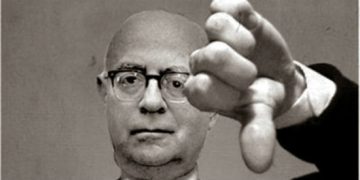Lewis Hodder at Art Critical:
 Academic, stuffy, German – Theodor W. Adorno has become emblematic of a certain sense of unfeeling in art. He was critical of TV, partial to Schoenberg, and aggrieved by the crassness of life in exile in 1940s America. Some of his students, infatuated with the youthful spontaneity of 1968, supposed that Adorno represented the old institutions that continued into post-war Europe, seeing his criticisms of mass culture being ‘pre-digested’ as identical to the conservative dismissal of contemporary art, culture, and even values. Determined to take action, they scrawled ‘If Adorno is left in peace, capitalism will never cease’ on the blackboard. Three of them surrounded him and exposed their breasts as others handed out leaflets proclaiming, ‘Adorno as an institution is dead.’ Adorno would confide in Max Horkheimer, writing: ‘To have picked me of all people, I who have always spoken out against every type of erotic repression and sexual taboo!’
Academic, stuffy, German – Theodor W. Adorno has become emblematic of a certain sense of unfeeling in art. He was critical of TV, partial to Schoenberg, and aggrieved by the crassness of life in exile in 1940s America. Some of his students, infatuated with the youthful spontaneity of 1968, supposed that Adorno represented the old institutions that continued into post-war Europe, seeing his criticisms of mass culture being ‘pre-digested’ as identical to the conservative dismissal of contemporary art, culture, and even values. Determined to take action, they scrawled ‘If Adorno is left in peace, capitalism will never cease’ on the blackboard. Three of them surrounded him and exposed their breasts as others handed out leaflets proclaiming, ‘Adorno as an institution is dead.’ Adorno would confide in Max Horkheimer, writing: ‘To have picked me of all people, I who have always spoken out against every type of erotic repression and sexual taboo!’
It is here, then, that we arrive at Aesthetics, a book that immediately appears to confirm this suspicion of conservatism; with lectures on Kantian and Hegelian aesthetics, the enlightenment, Bach, beauty, ‘sensual immediacy’, Jugendstil, they hardly relay the sense of urgency felt in Europe in 1968.
more here.
